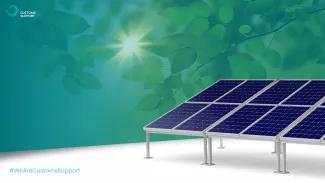What is meant by “traditional” and “alternative” energy?
“Traditional fuels” refers to fossil fuels: coal, oil, and gas. “Alternative energy” refers to fuels that do not take up resources from the Earth or harm the environment. Examples of this are wind, solar, and tidal energy.
Human-amplified global warming – climate change that is a direct result of human activity and not a natural part of the Earth’s atmospheric cycling – has been attributed to the burning of traditional fuels. Therefore, governments and organisations around the world are invested into promoting the development and adoption of alternative energy – and reducing the use of traditional fuels.
How does customs help?
Traditional fuel supply chains are very simple. Coal, oil, or gas is transported in bulk and delivered to the destination as a single commodity.
To discourage their use, customs authorities in the EU and UK levy a climate change excise rate on these commodities. The cost for the end user in these European zones is far higher than it is in other countries around the world which are not actively trying to reduce their use.
By contrast, duties on several alternative energy supply chains are reduced. For example, importing a completed solar panel (HS code 8541430000) or a wind turbine (HS code 8502310085) into the UK attracts a 0% duty rate from all third countries.
Furthermore, manufacturers of these items can use special procedures like Inward Processing Relief (IPR) to reduce or eliminate their duty spend when importing the components or materials for assembly – assuming that they haven’t already obtained preferential origin for the materials.
Check out our blog on manufacturing and customs for more information.
Does this really have an effect?
Yes. Emerald Insights published a report in 2022 that outlined the decline in solar panel costs between 2006 and 2015. The report names several contributing factors, such as availability and progression of technology, but it is clear that government and customs policies for alternative energy had a strong impact on the price reduction and adoption.
Increased investment and adoption in the European Union is clear from the trend data available at Europa, which shows that imports of solar panels (by value) have increased by nearly 150% in the last five years (since 2018).
Imports of liquid biofuels and wind turbines have also increased significantly, but not to the extent that solar panels have. It can be speculated that these are commercial and government imports whereas solar panels are more consumer-led, so adoption will be slower.
In the UK, freeports have been announced in England, Scotland, and Wales since Brexit. Every zone has been granted customs benefits relating to alternative energy in order to attract investment. For example, Freeport East has awarded preference to offshore wind companies at the Port of Harwich, as well as technology companies working with hydrogen gas at the Bacton Gas Terminal in Norfolk.
Need help with importing alternative energy products?
Customs Support works with energy suppliers and manufacturers throughout the EU and UK, helping them leverage customs procedures to reduce their duty spend and keep them more efficient.
If you could benefit from local customs representation in more than 13 countries across Europe, contact us today to find out what we can do for you.















